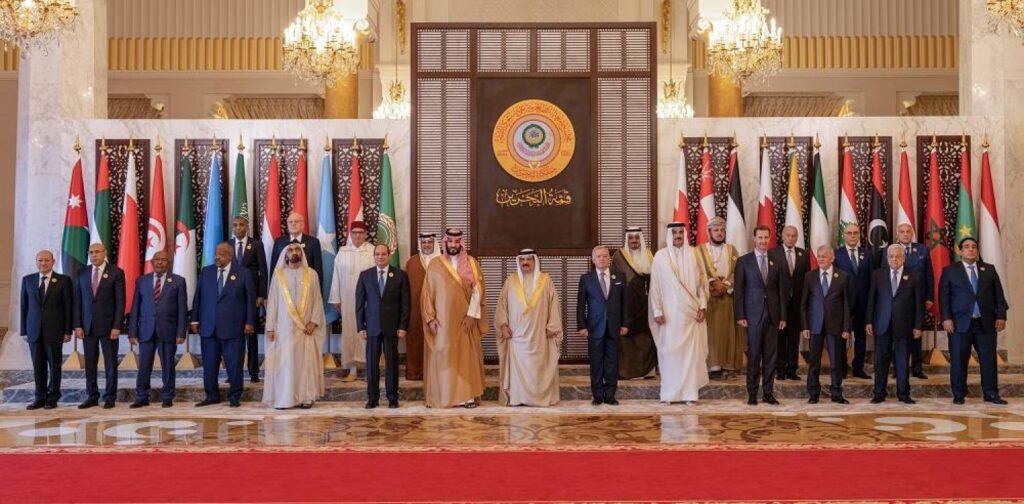The 33rd Arab Summit in Manama, Bahrain, the first such meeting to be held in the city, ended in unusual circumstances. Since the first Arab Summit in 1946, a recurring theme has been the concept of “exceptional and complex circumstances,'' and this conference was no exception. The focus of concern is the conflict in the Gaza Strip, which has now been mired in an eight-month stalemate with no immediate resolution in sight. The situation is on the brink of a protracted war of attrition, the effects of which could ripple throughout the region and affect Arab states directly and indirectly involved in the conflict.
During the summit, the US government unveiled to Congress a new $1 billion arms package for Israel. The revelation came shortly after Washington warned to withhold certain weapons from Israel over concerns of an attack on Rafah. Despite opposition from some inside the country, the arms deal was approved with significant support from Republicans and strengthened Israel's military. This development raises several concerns, including the possibility that Israel could launch an operation in Rafah or as leverage for Prime Minister Benjamin Netanyahu to reconsider an attack on Rafah, a key Hamas stronghold in the Gaza Strip. scenario will be opened. Historical precedent suggests the latter is more likely. For example, during the withdrawal negotiations with Egypt in 1973, US Secretary of State Henry Kissinger guaranteed compensation for wartime losses and provided Israel with advanced weapons previously unavailable to Israel, even as a NATO ally. Israel withheld the agreement. A similar situation arose after the 2006 Israel-Hezbollah conflict, but the conflict intensified after the United States provided large sums of arms to Ehud Olmert.
However, this arms deal is not the only complicating element in the Arab-Israeli conflict matrix at this extraordinary time. What needs to be reassessed is the Arab attitude towards this protracted conflict, now in its 75th year and characterized by constant fighting and little gain from Arab summits. Throughout history, there have been many summits dating back to the 1940s, each coinciding with a pivotal historical moment. Arab countries have had mixed reactions to these summits. Some led to decisive action to effectively deal with the crisis, while others amounted to little more than words. Since the establishment of the Arab League in 1945, Arab leaders have held 48 summits, including 32 regular meetings and 16 emergency meetings, including the recent Arab-Islamic Summit in Riyadh. It is.
Curiously, the League's official records do not mention the first Anxious Summit in May 1946, convened by King Farouk I of Egypt and attended by the seven founding members of the Arab League. The main objective of the summit was to express solidarity with Palestine, leading to important resolutions such as recognizing Palestine as an integral part of the Arab world and addressing the Zionist threat to all Arab and Islamic countries . Similarly, the 1956 Arab Solidarity summit, which supported Egypt against invasion by the three powers and defended the sovereignty of the Suez Canal, is also missing from the list of regular summits. This oversight requires a comprehensive reassessment of priorities and understanding of key issues.
Time has passed between Anxious and the Manama summit, and the opponents of past resolutions are not the same as they are today. The dynamics of the conflict have changed, resulting in diverse Arab perspectives on the Palestinian-Israeli issue. Some argue for a complete settlement and restoration of all land, while others advocate compromise and pragmatism to prevent further territorial loss. Prolonged conflict, as seen in civil wars across the region, has allowed outside powers to exploit Arab divisions for expansionist purposes.
Differences among Arab leaders have led to the perception that Arab summit resolutions are often contradictory. Officially they denounce this “usurper,” but many are associated with the group as trade and economic allies. Most Arab League member states have formal relationships with the organization, while others maintain separate relationships. This evolution, shaped by current conditions and power relations, is not entirely unforeseen in politics and international relations. But concerns arise when, rather than directly confronting the Arab-Israeli conflict, conflicting ideologies are forced upon the population, sowing confusion and calling into question national issues.
Despite its unusual background, the Manama Summit highlights the urgent need to redefine fundamental concepts related to one of the most important Arab issues. Rather than clinging to the exceptional nature of the summit, he said it is essential to identify the real enemy across religious or political boundaries. After nearly 75 years of Arab-Israeli conflict, nearly 48 Arab summits, and enormous human and economic costs, a paradigm shift is essential. We must build appropriate new concepts for navigating the evolving Palestinian crisis, based on candid answers to important questions that require attention. Must we surrender to endless wars? What are the real gains and losses from a conflict with Israel? If Israel is indeed the main enemy of Arab states, how do we rationalize internal conflicts in Libya, Syria, Iraq, Yemen, Sudan, and Lebanon? Is it okay?



